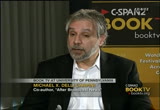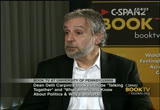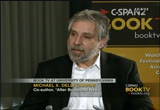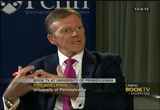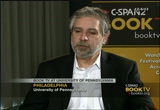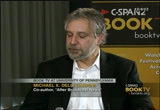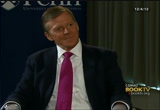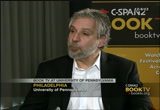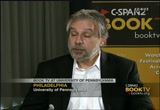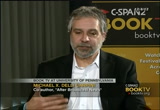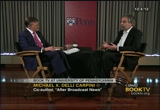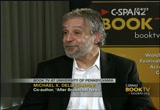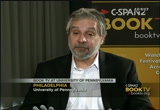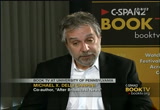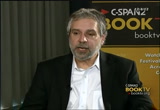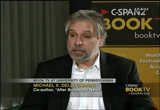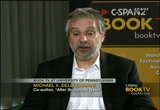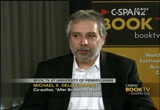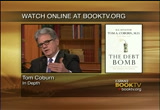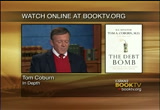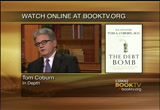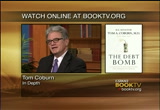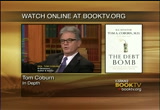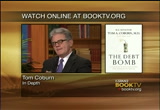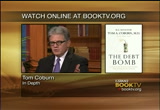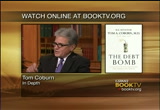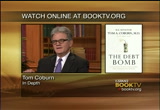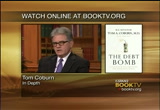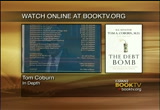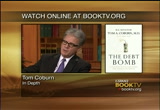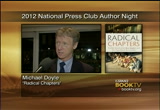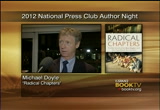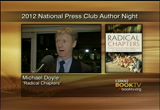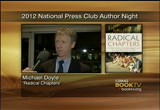tv Book TV CSPAN January 21, 2013 1:25am-2:00am EST
1:25 am
the three big changes are the blurring of news and entertainment. but it is more than that. the blurring of producers and consumers and the impact of twitter and u2 had in the air of spring revolution and the third is the blurring of fact and opinion. the first time when they show of factual information and when we would hear opinions that is broken down. not the least of which is the technological revolution over the last 20 years.
1:26 am
>> host: have lost gate keepers of news? >> guest: that is a central theme that that we call as the honored that term is simple fact the way that information could become public information is that you could argue you don't need dates so what becomes newsworthy and what goes by role is very different from just prior to this area but we cannot just compare what we have now to what preceded the 50 years of broadcast news. hysteric -- historically we
1:27 am
have five media regimes in which the relationship between the media citizens so if you want to assess what is good or bad you need to look not just out of the lobster gained which is the era of realism but banda a late 18th-century that that issue in front of us what is good about it and had to maintain or limit what is bad. >> host: go to do the title "after broadcast news" would have lost as opposed to abc, cbs, nbc era? >> guest: we lost the
1:28 am
significant thing. but when we lived in the era of the '50s and '60s through the '90s where we as a society that if we watched the local news and national news we would have the information we need to be good citizens. what we lost that somebody's whose job is to sift through the information of all the things that happen in a day that we will tell you what you should pay attention to.
1:29 am
and at the height of the book and the era said vast majority was talking about a community. and that those three stations and magazines told us what we should focus on. that is the agenda as a community of citizens to think about issues to have the same basic underlying understanding. >> host: michael x. delli carpini what have we gained? >> guest: the downside is the handle but they did not emphasize something to a lot of people the facts were wrong war presented
1:30 am
something then we all got that. we sunk or swam with major news outlets. everybody watches every veils the is no single authoritative source that this means there is real opportunity the voices in the past would not have been heard or making it to the national agenda to become important because someone other than the professional journalist told us. >> host: are we better informed today? >> guest: and interesting question. still in a transitional period of potential for more informed is greater now but
1:31 am
there is no evidence that we are. they do work of what we know about politics but at worst may be in a situation people who care about politics because there are so many places to go but some of the opt out entirely to those who want to watch entertainment purely at the 6:00 time frame is still watching they cannot doubt entirely. solely to be more informed that we argue both are possible but he could have a
1:32 am
population of very informed people who opt out entirely. >> host: look at the revolution we live cyrano is there a comparable period in history? >> guest: not completely. it is important to realize there are things fettered different the there has never been an opportunity to go to baltimore sources for the agenda without the news media being responsible but think about fox news or ms nbc that they are more enamored of there it is ideological views.
1:33 am
those that were lined is one party or another to argue for or against the with the gossip columnist from 18th century one man did exactly the same thing so we have that experience where the lines between news and entertainment were completely blurred so they may have a news story or opinion piece of what comes in on the latest ship and it looks more like a web page in the 20th century but we
1:34 am
have not experienced it all coming together with this new technology. but i depend on a lot of sources. i don't watch the three broadcast dandified do it is more as an academic to see what they are doing or to watch cable new shows between fox and ms nbc also to see how they spend at. by the time i get home i already know the major story from the e-mail blast was to various websites the present breaking news for:so i will read things like slate or the "huffington post."
1:35 am
even if i try to separate it is what we suggest in the book to be news grazers that i should add "the daily show." i am a big fan. >> right now just like the cold bare report speaks to power better that they do a great job highlighting the issues of the day but critiquing journalist and the political system the honesty and the accuracy with the media system right now.
1:36 am
>> host: michael x. delli carpini is our guest. dean, you say you have progressive use and let's get the "huffington post" army in a period of stovepipe being our views? >> a lot of evidence that is happening that readers and viewers gravitate toward news outlets that are most similar to their own so look at look at fox news service nbc some people will go and watch something that is different from what they believe but there is evidence of people to frighten themselves that create what samisen calls
1:37 am
the accord chamber they hear the news you already agree with. the with breaking that is where we go when not looking for news that after 9/11 whenever web site you went to sports, entertainment, people were talking about real world events. sunday as health issues sandy one to find the diagnosis or prognosis you can find health-related policy. my hope is that people will attend to different points of view. number two, the larger information provides opportunities when you
1:38 am
accidentally bumped into relevant information. >> bruce williams at the university of virginia media studies program we went to graduate school together bruce and i have been working on this with the first discussion to write something on this topic 20 years ago when he noticed the changes. >> host: of what are you most excited of news dissemination? >> it is the opportunity for voices outside the media agenda to be able to be heard. the greatest most recent example is what role it
1:39 am
plays is the era of spring. no doubt that was generated by years of concern of political freedom, economic concern that the ability for the spread is the direct result of the ability of people of mobile technology to share ideas and thoughts city going journalists had don't access there was information coming that juror attention to issues. that happens all the time of the various communities in the united states that are ignored because of class or race or gender issues now to get the message out that
1:40 am
gets me most excited. requires more citizens i still think we need gate keepers and professional journalist but it did say more in a democratic world. >> host: michael x. delli carpini at 10 years and now, "washington post" and "new york times" be around? >> yes. i could be wrong but my guess is in any form that we recognize i was concerned so we have to separate the mechanism by which they operate what organizations do day of work for, written visual, television?
1:41 am
with the economic model and the zero will there is a place for people whose job is to help us sift information that is one voice among many to learn about the public world. >> host: is that the main question? >> often times especially from undergraduates, so? that is the world they grew up. first-year students were born 1992. so the way the media operates is then to
1:42 am
understand the new world but many of them are interested to be a journalist also through communications and media but that would be different in five years from now. >> host: we talking with the dean of vandenberg school of communication from the university of pennsylvania, "after broadcast news" media regimes, democracy, and the new information environment" co-author bruce williams. michael x. delli carpini. thank you for being with us on the tv.
1:43 am
>> host: 10 things congress does not want you to know how it does business. number four, to be unsafe noncompetitive season holds fund-raisers outside their districts to increase leverage over other members. number five, congress spends more than $100 billion every year on 200 programs that are not authorized by law. number six, congress routinely raids the social security trust fund to cover general revenue shortfalls. >> guest: looking at the appropriation bills and not done the last two years and say we appropriate x amount of money it is over
1:44 am
$350 billion that which is not funded and it tells you there is the imbalance in congress had we appropriate funds we have not said we spend money on? that tells you the power of the benefit going back to what is the most important but is it more important to think what is the health of the country and the long run? to put yourself on the losing side of every argument coming have to work hard to explain yourself. >> members of congress to not have the opportunity to read the bills they vote on. >> one of the most secret and intimate -- ways is to
1:45 am
report language only members of the committee can vote or amend. each year congress spends countless hours to debate the budget resolution and has no intention of keeping. number 10, congress circumvents its own budget limits to avoid public scrutiny by exploiting its own budget. >> guest: those are all true. >> host: the budget resolution. is it a waste of time? >> guest: no. right now we have three point* $6 trillion spending the big criticism is and that congress is gridlock. had reauthorize spending
1:46 am
three point* $65 trillion? to spend on things that are not necessary and then to look good to constituents to spend kids his future in washington we would not spend three point* 6 trillion if lee had that that we've passed the budget we bar of 1.2 trillion dollars that we did not have the literally no benefit for the citizens of this country than those that chuck the money to develop or give up the program.
1:47 am
you could look with the wind every program stand up and what you see is minimal. because members of congress have oversight turn a blind eye that it is hard and i will be criticized when they do so let it go. now $350 billion worth of programs were appropriated many never authorized or it has lapsed. so of we appropriate money and why not have that committee to put them all in one? we could ignore our own
1:48 am
rules. >> host: how much fear is there with members of congress of criticism to not be reelected? >> guest:. >> for a larger perspective i was a businessman before and i became a physician as an older individual. i was known as grand bought in might medical school class and practiced 25 years. my goal was to be a physician. i was at risk with the only with my patients. to put it into context the depends the goal on the
1:49 am
senator. is to fix the problem to create a good as a future as we have had it is that is above to get an office with notoriety you would keep that fear in perspective. when the number one goal is the position or the notoriety is to secure the future so how you value your position on certain policy changes. that is not a impure or terrible but nature.
1:50 am
but if you ever secure liberty and freedoms for our kids stop sending it to the politicians. >> host: did you get hosta reaction from your colleagues for your book? >> guest: i don't think many colleagues have read it but i make these speeches in my own caucus. i am okay to take that consternation in criticism of i think our country is in trouble. we are bankrupt. if you take generally accepted accounting principles just like c-span or county governments have to operate we have no idea
1:51 am
where we get the money over the next 75 years. $88 trillion. that is one point* $05 trillion of bills coming due than we have. if you did not grow the economy at all, a white reporter self in that position? the fed has increased its balance sheet they printed $2 trillion worth of phony many and ultimately the pain will fall on the middle-class and the very core. it is the most -- both parties say they want even if it means we lose our seat
1:52 am
reporters cells first instead of the country. it is not hard any citizen if they read back in black there is common-sense ways to save money. just this last week the air force announced this year we spend $64 billion on miti projects 64 billion said gao says half of that will be wasted. it will never be completed. and back in black the city ought to cancel this because it will never work. this is out inefficient government is. finally the air force
1:53 am
canceled the spent another 100 million first. they paid the settlement fee to cancel of $8 million. but the person responsible did not get fired and not held accountable. those that did not provide the service got their money back. nobody runs their household that way. most state governments operate the we are incompetent when it comes to spending america is taxpayer money would raise $32 billion for year on programs that don't work? that is 60% of what they want to take additional lay out of the pentagon. where does the leadership say we will stop? to have a special
1:54 am
subcommittee with the bad actors and we demand those people get fired but none of that happens. you could not perform on a contract and do it with impunity because members of congress are basically not willing or inexperienced to know you should hold people accountable whether a federal employee but that is one example just this week. >> host: what was the business you built? >> guest: my father started of machinery manufacturing business for our farming business. i had a different lens
1:55 am
division in southern virginia 1969 through 2,008. >> host: does still exist? >> it has been sold portions of it exist. >> we're here is the author of radical chapters the kevlar bookstore was open in 1950 fined one negative a 1955. who was roy? >> guest: most influential peace activist of his generation, he helped found the first listener's sponsored radio station in the country, he helped to lead the war resisters league and found the first free university in helped to lead the vietnam war in the '60s and so is the radical
1:56 am
chapters talks about through his life. >> host: paperback revolution? >> guest: 1950 paperback books were scandalous, pornographic, ty pified by mickey spillane of the paperback revolution was the explosion like the internet in the '90s of ideas into use cheap formats. up through the fifties a hardcover book was a true book. suddenly ideas were sold for cheap to the mass audience. >> host: laurents is the owner of city lights bookstore in san francisco
1:57 am
and what was it like back then? it. >> guest: a carnival of ids of place people would go to buy books or me inspired. the prize-winning american writer told me it was a great bookstore and a good place to pick up checks for entertainment and to have the peace demonstration a place where jerry garcia would meet there when the parents of a girlfriend had no idea what was going on. almost anything could happen >> host: how will you interested in his life? >> guest: i went to the bookstore in the bay area.
1:58 am
later when i worked for the bookstore with the free university policies would encircle 1 degree orencircle 1 r for i corrupt buying books from him and it dawned on me there is a booktv written about the totality of his life. >> host: does is still exist? >> guest: when data is business in 2005 that the community would not allow it and put back into business after raising money. this year again the sun would put out of business and once again the community raised seven and a thousand dollars for the bookstore was sold to the new owner and the business is thriving
1:59 am
84 Views
IN COLLECTIONS
CSPAN2 Television Archive
Television Archive  Television Archive News Search Service
Television Archive News Search Service 
Uploaded by TV Archive on

 Live Music Archive
Live Music Archive Librivox Free Audio
Librivox Free Audio Metropolitan Museum
Metropolitan Museum Cleveland Museum of Art
Cleveland Museum of Art Internet Arcade
Internet Arcade Console Living Room
Console Living Room Books to Borrow
Books to Borrow Open Library
Open Library TV News
TV News Understanding 9/11
Understanding 9/11